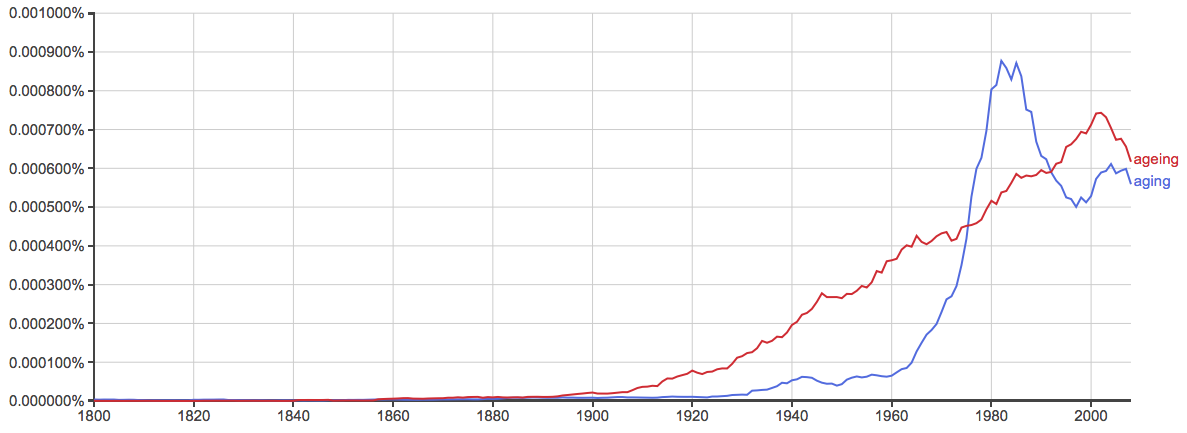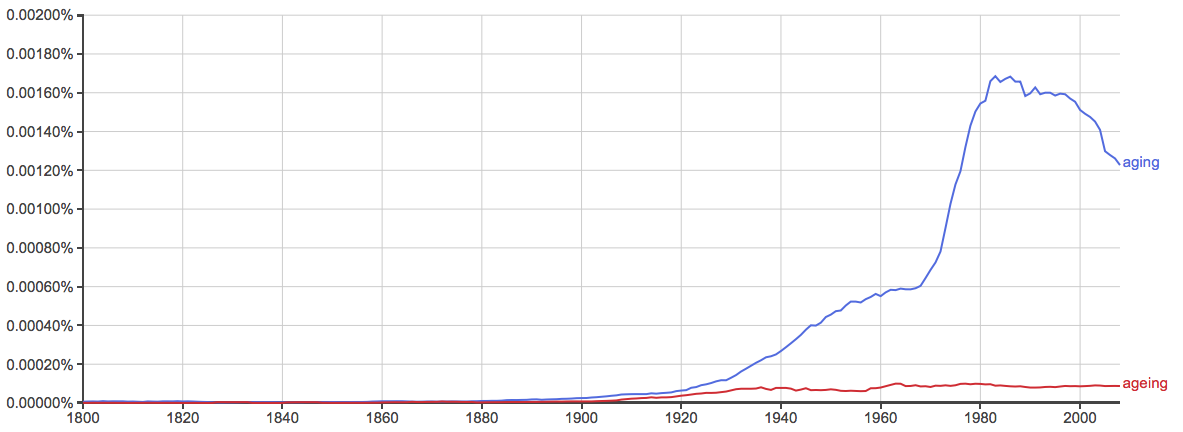Spelling differences between American and British English are enough to give writers fits. The same word is often spelled differently, depending on the background of the writer. There are many different spelling conventions between these two language communities, and none of them makes life simpler for writers.
Aging and ageing, for instance, are two spelling variants of the same word. Americans often drop the final -e in words when adding a suffix, but the British are less likely to do so.
Continue reading to find out more about the differences between these words.
What is the Difference Between Ageing and Aging?
In this article, I will compare ageing vs. aging. I will outline when each spelling is appropriate for your writing and use each of them in example sentences.
Plus, I will show you an easy way to remember whether aging or ageing is the better word to choose.
When to Use Aging
 What does aging mean? Aging can be an adjective or a verb.
What does aging mean? Aging can be an adjective or a verb.
As an adjective, aging means getting older.
As a verb, aging is the present participle of the verb to age, which means to get older.
Check out the examples below,
- The aging bridge could not sustain the weight of so many heavy trucks, and collapsed into the inky blackness of the river.
- Marcia’s laptop was aging gracefully; though it was approaching five years old, it seldom got hot and never crashed.
- Before aging out of the league, Angela scored 36 goals as a member of the Tri-City Triceratops.
- However much they quarreled over illegal immigration, political leaders in both parties used to agree that the U.S. needs more legal immigrants to sustain its aging labor force. –The Wall Street Journal
Aging (spelled without the “E”) is the standard spelling in American English spelling. If you are writing to an American audience, this is the spelling that you will want to use.
When to Use Ageing
 What does ageing mean? Ageing is a spelling variant of the same word. Where aging is used in American English, ageing can be used in British English. It has all the same meanings in all of the same contexts.
What does ageing mean? Ageing is a spelling variant of the same word. Where aging is used in American English, ageing can be used in British English. It has all the same meanings in all of the same contexts.
- The discovery adds to a wave of new findings hinting at the possibility of a future in which doctors can treat ageing itself, rather than trying to combat the host of diseases that come along with it. –The Guardian
This graph shows the relative usage of ageing vs. aging in British English:

Aging appears to have steadily gained popularity in British English over the years. For a brief period it was actually used more often. For the time being, however, ageing is still the standard spelling in British English.
Here is a similar graph charting the two spellings in American English.

As you can see, the use of aging vs. ageing in American English has remained much steadier over time.
The graphs aren’t scientifically accurate, since they only examine books published in English since 1800, but they are still useful for visualizing clear long-term usage trends.
Trick to Remember the Difference
Choosing between these words is as simple as considering the makeup of your audience.
- If you are writing for primarily American readers, choose aging.
- If your readers are more likely to be British, use ageing instead, although British readers will still recognize aging.
Since ageing contains the letter E, like England, knowing when to use this word should be simple.
Summary
Is it ageing or aging? Ageing and aging are spelling variants of the same word. As an adjective, it means getting older. As a verb, it is the present participle of to age.
- Aging is the American variant.
- Ageing is the British variant.
Ageing and England are both spelled with an E. Therefore, remembering to use ageing with British audiences is not difficult.
Don’t forget, you can always reread this article if you need a quick refresher.
Contents
